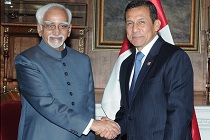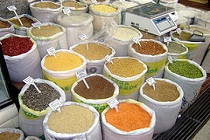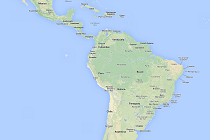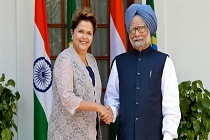India-Latin America Engagements, November 2013
In 'India-Latin America Engagements', the Latin America Desk at Gateway House presents a selection of news of India’s engagement with the region during the previous month
 Courtesy: Ministry of External Affairs, India
Courtesy: Ministry of External Affairs, India
In 'India-Latin America Engagements', the Latin America Desk at Gateway House presents a selection of news of India’s engagement with the region during the previous month
 Courtesy: Vitasta Publishing Pvt. Ltd.
Courtesy: Vitasta Publishing Pvt. Ltd.
In ‘India-Latin America: An Alliance for the Future,’ Soraya Caro questions the mutually distorted perceptions between Indians and Latin Americans, and offers a new multi-dimensional lens for looking at bilateral ties
 Courtesy: Rigues/Flickr
Courtesy: Rigues/Flickr
A recent UN report praises governments for promoting the right to food. At the same time, India’s Food Security Act will encounter resistance at the WTO meeting in Bali in December. Can India play an exemplary role in the global power struggle over food security?
 Courtesy: Berardo62/Flickr
Courtesy: Berardo62/Flickr
India’s oil imports from Latin America increased from 4.5% in 2003 to 11% in 2012-13. This marks a diversification in India’s energy policy. With Latin America’s surplus energy production and discoveries in off-shore oil fields, India must further consolidate its oil trade with the region
 Courtesy: Google Maps
Courtesy: Google Maps
In 'Latin America Update' Gateway House lists some of the important events in Latin America over the past month
 Courtesy: Roberto Stuckert Filho/Wikimedia Commons
Courtesy: Roberto Stuckert Filho/Wikimedia Commons
In 'India-Latin America Engagements', the Latin America Desk at Gateway House presents a selection of news of India’s engagement with the region during the previous month
 Courtesy: Ministério da Saúde/Flickr
Courtesy: Ministério da Saúde/Flickr
After revelations that the U.S.’s NSA spied on her, Brazilian President Dilma Rousseff has ordered a series of measures to ensure online independence and called for an equitable global internet infrastructure. India can follow Brazil’s lead and make its communication systems less vulnerable
 Courtesy: glaubercavalcante
Courtesy: glaubercavalcante
Like Brazil, many other countries in Latin America have implemented successful poverty-alleviation programmes, including cash transfers, as part of an overall strategy for reducing inequality. These programmes can be a model for other developing countries
 Courtesy: Yassin/Flickr
Courtesy: Yassin/Flickr
Brazil, despite the presence of good leadership, several consistent and successful development programs, and recording their lowest unemployment rate, witnessed widespread protests this June – triggers for which weren't conventional. What are the Brazilians protesting against, and what does it indicate?
 Courtesy: BenjaminThompson/Flickr
Courtesy: BenjaminThompson/Flickr
According to the UN Economic Commission for Latin America and the Caribbean, the Latin American region is expected to grow at 3% in 2013. Although the growth appears modest, it is not bad given the GDP contraction in the Eurozone in the past two years and the lower growth rates in the rest of the world